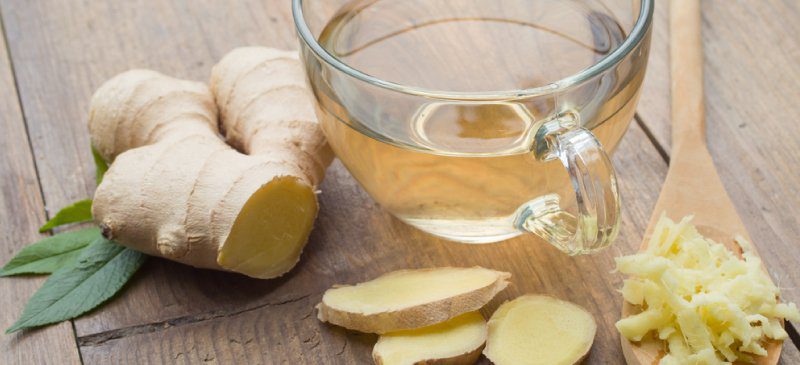HEALTH: Benefits of Ginger Root and Ginger Tea
by Jenny Hills
Ginger root is a delicious herb that has powerful medicinal properties. Fresh ginger root, dried ginger, and ground ginger powder all have anti-inflammatory, antimicrobial, and anti-spasmodic uses in natural medicine. You can eat raw ginger or drink ginger tea to help prevent and treat nausea, improve your cardiovascular health, and boost your brain function.
You can get the many health benefits of ginger root if you add fresh, minced, grated or ground ginger to your diet. You can use fresh or ground ginger to make a therapeutic ginger tea. Or, you can chew on fresh ginger to help relieve nausea. Also, adding ginger to your cooking doesn’t destroy many of its therapeutic properties.
In this article, I will look at what science says about the true health benefits of ginger. You will also find out how to make your own ginger tea at home that you can enjoy at any time of the day.
Fresh Ginger vs. Ground Ginger (Powder Form of Ginger)
To benefit from the medicinal value of ginger (botanical name is Zingiber officinale), it is important to know which the best kind of ginger to use is. The good news is that both fresh ginger and ground ginger powder have many health benefits.
Research has discovered that fresh ginger contains many anti-inflammatory properties and antioxidants called gingerols and shogaols. Gingerol compounds are more prevalent in fresh ginger. Gingerols have been linked to reducing obesity, treating diabetes, and they also have anticancer properties.
Drying ginger and making ginger powder changes the chemical makeup of ginger. Dehydrating ginger causes an increase in the amount of shogaols in ginger powder. Research suggests that shogaols are more potent than gingerols in treating and preventing many health conditions.
Interestingly, the Journal of Chromatography B reported that the antioxidant activity of ground ginger is over 5-fold higher than fresh ginger.
Studies have also shown that boiling or roasting ginger for between 2 and 6 minutes actually increases the antioxidant potential of ginger.
Both fresh ginger root and ginger powder have powerful medicinal compounds that have antioxidant properties. Some researchers say that dried ginger powder can be a more cost-effective way to get the medicinal benefits of ginger with the advantage that it doesn’t go off.
So, you should not be overly concerned about the difference between using fresh or ground ginger for its health benefits.
Ginger Nutrition Facts
Ginger root is good for you because it contains vitamins and minerals as well as antioxidants.
The nutritional value of 100 g fresh, raw ginger root is the following: (6)
- 80 calories
- 17.7 g carbohydrates
- 1.82 g protein
- 2 g fiber
- 1.7 g sugar
- 16 mg calcium
- 43 mg magnesium
- 415 mg potassium
- 13 mg zinc
- 5 mg vitamin C
The book Herbal Medicine says that ginger has over 115 therapeutic compounds. Gingerols and shogaols in ginger have antioxidant, anti-inflammatory, anti-nausea, and anticancer properties. Ginger root and ground ginger can also help prevent cardiovascular disease.
Benefits of Ginger and Ginger Tea
Let’s look in more detail at the many health benefits of ginger tea, consuming fresh ginger root, or taking powdered ginger capsules.
Ginger is Anti-Inflammatory and Can Help Manage Arthritis Symptoms
Reducing inflammation is an important health benefit of taking ginger root or drinking ginger tea.
6-Gingerol is one of the main anti-inflammatory components in ginger. Research has suggested that gingerol helps to inhibit substances and enzymes that cause inflammation.
Ginger extracts can be beneficial to reduce inflammatory pain caused by osteoarthritis. One study found that people with osteoarthritis who took ginger extract experienced a reduction in inflammatory pain. When compared to the anti-inflammatory drug diclofenac, scientists noted that ginger was just as effective but had less gastrointestinal side effects like heartburn.
Research into the effects of gingerol and shogaol compounds in ginger has found that consuming ginger can help relieve joint inflammation in rheumatoid arthritis. Scientists found that ginger taken orally has a similar effect to NSAIDs (non-steroidal anti-inflammatory drugs) like ibuprofen in reducing pain and inflammation.
If you suffer from forms of arthritis, ginger root capsules can help to reduce your symptoms. You can also add grated ginger to your diet by adding it to salads, using in a stir-fry or adding it to hot water to make an anti inflammatory ginger tea.
Ginger May Help Reduce Pain
The pain-relieving properties of ginger tea can also help to reduce pain, especially muscle pain after exercise.
A systematic review of 7 studies into the analgesic effect of ginger found that it can help relieve painful muscles after resistance training. Researchers found that supplementing your diet with 2 g ginger (1 tsp) per day can help to lower muscle pain when taken for at least 5 days.
Other studies have found that ginger can help to reduce inflammation that is the result of cardio exercising.
A review of medical studies over a 10-year period concluded that ginger helps to reduce the progression of muscle pain over a period of time. Some researchers have found that taking ginger before cardio exercising could lessen muscle pain.
Ginger powder is also helpful as an anti-inflammatory, pain relieving remedy that is as effective as ibuprofen.
You can also find out how to make your own pain relief ointment using essential oil to help reduce muscle pain.
Ginger Can Reduce Menstrual Cramping and Pain
The anti-spasmodic properties of ginger tea can help to relieve abdominal pain associated with menstruation (dysmenorrhea).
One randomized, controlled trial on 120 women found that ginger root powder reduced menstrual pain. The women in the trial suffered from moderate or severe period cramping. Taking 500 mg capsules of ginger root powder three times a day helped to reduce pain and abdominal aches in the first few days of their menstrual period.
A systematic review of 7 studies also found that ginger powder can help to relieve menstrual cramping in the first 3 or 4 days of menstruation. These studies suggested that taking 750 mg to 2,000 mg ginger powder can help to relieve dysmenorrhea.
Ginger Promotes Healthy Digestion and Can Prevent Heartburn
Consuming more fresh minced ginger or drinking ginger tea can help to improve your digestion. Indigestion is often accompanied by heartburn (acid reflux) and excess gas.
One of the ways that ginger benefits your gastrointestinal system is that it helps food to pass through the digestive system easier. A study has found that taking ginger capsules can help food move through you digestive system faster. The researchers concluded that “ginger accelerates gastric emptying and stimulates antral contractions in healthy volunteers”.
Studies have revealed that compounds in ginger have a beneficial effect on the gastric tract and help reduce spasms. It was suggested that chewing ginger, taking ginger candies, consuming ginger tea, or taking ginger root capsules could all have a therapeutic effect in relieving gastrointestinal upset.
Ginger Helps Prevent Nausea and Vomiting
One of the most well-documented uses for ginger root or ginger tea is to prevent nausea and digestive upset.
The main medicinal compounds in ginger, shogaols and gingerols, help to soothe the gastrointestinal tract and help reduce symptoms of nausea and vomiting. Researchers describe ginger as having antiemetic properties and help relieve gastro-upset like abdominal cramping, nausea, and heartburn.
Ginger root capsules may relieve nausea and vomiting in pregnancy
In one trial, pregnant women received 1,000 mg ginger capsules per day or a placebo pill. The women taking ginger root pills reported a reduction in feelings of nausea and vomiting. The study concluded that ginger is good for relieving nausea and sickness during pregnancy.
Ginger powder capsules may reduce nausea during chemotherapy treatments
Ginger has antiemetic properties that also help treat chemotherapy-related nausea. One trial involved 576 patients. Those who took 500 mg or 1,000 mg ginger capsules per day reported a reduction in their symptoms of nausea.
Ginger Can Help Fight Infections
Ginger tea also has a positive effect on your immune system and can help you fight infections better.
Studies have found that gingerols and enzymes in ginger root and powder can reduce inflammation caused by viral infections. It was also found that ginger has antiviral properties.
Another study found that fresh ginger was superior to ground ginger root in helping to reduce the effect of respiratory viral infections. The scientists found that hot ginger tea made from fresh ginger has antiviral properties.
One study found that gingerols in ginger extracts have an antibacterial potential against various strains of bacteria.
As soon as you feel you are coming down with a cold or have the flu, drink ginger tea regularly to help boost your body’s defenses.
Ginger Can Help Keep Your Heart Healthy and Lower Blood Pressure
Regularly drinking ginger tea is good for high blood pressure because of the flavonoids and other antioxidants it contains.
Researchers have found that ginger extracts can help lower blood pressure. They found that compounds in ginger like 6-shogaol and phenolic constituents helped to lower blood pressure and regulate heartbeat.
Other studies have pointed to the fact that ginger helps to prevent many cardiovascular diseases. Ginger has an anti-hypertension effect and reduces inflammation which has an overall beneficial effect on the heart.
Ginger May Lower Cholesterol Levels Naturally and Prevent Blocked Arteries
Another of the benefits of consuming more ginger tea in your diet is that it can help to reduce levels of LDL cholesterol. Chewing ginger root can also help to prevent a buildup of plaque in your arteries.
The Journal of Nutrition reported that consuming ginger extracts can help to lower LDL cholesterol – the type of “bad” cholesterol that is associated with coronary heart disease. The phenolic compounds in ginger like zingerone, shogaols, and gingerols helped to reduce LDL cholesterol levels.
The above study also found that ginger benefits vascular health because it may prevent a buildup of artery plaque (atherosclerosis).
Atherosclerosis is a disease in which plaque builds up inside your arteries. It can cause narrowed arteries, angina, shortness of breath, stroke, and even a heart attack.



